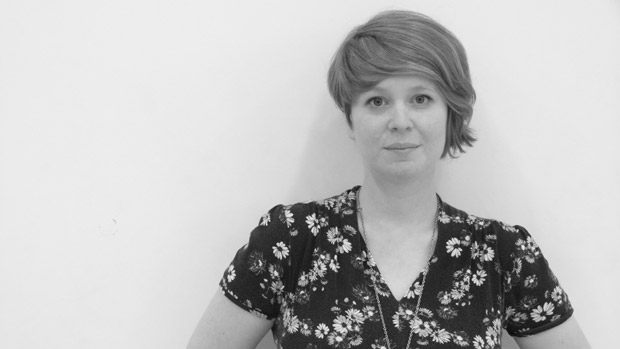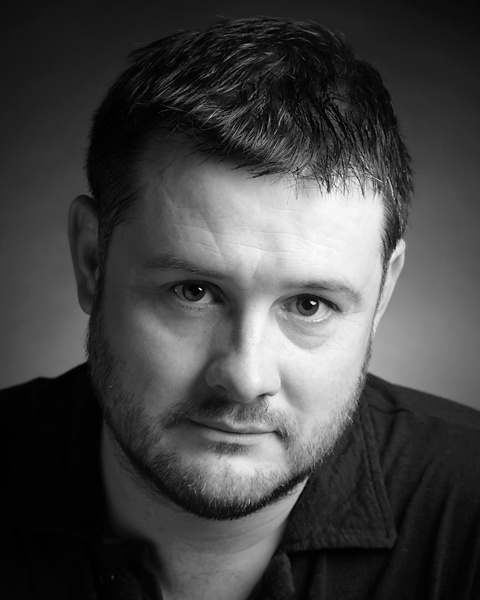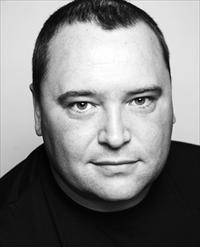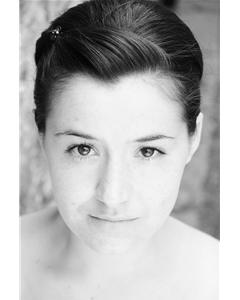As promised here’s my interview with The Other Room Artistic Director and Blasted director Kate Wasserberg and Blasted cast members, actors Christian Patterson (Ian), Louise Collins (Cate) and Simon Nehan (Soldier).
Why Blasted?
Kate: It’s two things really. I wanted to open The Other Room with a play that really used the intensity of the space, where being so close felt dangerous and exciting. And I wanted to interrogate our relationship with foreign wars. I find it very hard to watch the news since having my two children. It’s as if the distance between my life and those events has collapsed. And that’s what Blasted does – it collapses the distance. That seems to me to be a very humane thing to do, despite the violent things that happen in the play.

Artistic Director of the Other Room and director of Blasted Kate Wasserberg
Why do you think audiences still need to see this play?
Simon: It’s still relevant because of the base human actions in the play. It strips humans down to being animals I think. Acts of aggression and sexual encounters in the animal kingdom just happen, often without consent, which is what happens in the play. It’s a hard watch because people refuse to believe we have these instincts and are capable of these actions. Some of us are. The real drama of the play comes from the human guilt of these actions and a kindness to look beyond them.

Simon Nehan (Soldier)
Christian: It’s a game changer. In the same way as John Osborne’s Look Back in Anger changed the face of theatre in the fifties, Sarah Kane did the same thing in the nineties with Blasted. The play is twenty years old but still reads like a new play… that is very rare. I think audiences should see plays like Blasted because it evokes, provokes and demands a response. You may love it, you may hate it, but you’ll definitely have an opinion and a reason why.

Christian Patterson (Ian)
Louise: My line “looks like there is a war on” for me is when I feel war inside. I have been violated and so my view on the world has been too. If we carry on abusing each other on a personal level then we will always be at war.

Louise Collins (Cate)
What were your thoughts before rehearsals?
Christian: When Kate offered the part to me I bought the script and read it for the first time. If I’m honest I couldn’t believe what I was reading. I laughed out loud, I was very moved, but above all I was deeply shocked. I couldn’t stop reading… and it was for that reason I decided to accept the part. I knew it was going to be challenging but ultimately I hoped it would be rewarding… and it most certainly was.
Louise: I was thrilled. I knew what an honour it was to be in The Other Room’s opening production. Fear equalled that thrill as this phenomenal play demands facing the bleakness and darkness of humanity which in my day to day life I try to avoid.
Simon: My first thought was how are we going to stage it? How graphic are we going to be? There are so many technical parts to the play and we only had three weeks to pull it off.
What’s it been like working with the cast?
Kate: They are all actors I have worked with before but never all together. They are amazing. To do this play for real, to go out there every night and really be in that place and never fake it – that is an extremely rare and astonishing thing. Plus they are all very funny and generous people so it was lovely to work with them.
What’s it been like working with director Kate Wasserberg?
Louise: I am so grateful Kate gave me the opportunity to play Cate. I’m lucky. The acting industry can be full of ego and profile but she sees things in me I don’t even know are possible and that’s the beautiful relationship between an actor and director.
Simon: I’ve worked with Kate before this project in Clwyd Theatr Cymru. Kate is a real actors’ director. She leaves you to put it on its feet and nudges or pulls you (if needed) in the right direction. You really feel like you have an input into the process and that it’s a collaboration.
Christian: This was my fourth play with Kate. I don’t think I could do for others what I can do for Kate. She never casts me in an obvious part…most directors wouldn’t consider me for Roma in Glengarry Glen Ross, Casimir in Aristocrats, and certainly not as Ian in Blasted. She really challenges me. When the phone rings and it’s a job offer from Kate I know to strap myself in and trust her implicitly.
How do you think set, lighting and sound have shaped this production?
Kate: We were incredibly lucky with the team. Max Jones and Ruth Hall designed the set and it’s an extraordinary achievement in that space – a design that reveals itself as the play goes on and is a character in its own right. Tom White’s lighting is bold and beautiful and Dyfan Jones did fantastic work on the sound design. The composer and playwright Nick Gill wrote an album in response to Blasted especially for us, which we used throughout. The tender and poetic view the music takes of the play had a huge effect on me and I really tried to find that tenderness in the scenes.
The Other Room is a small venue; with only forty-four seats what challenges has it posed?
Kate: It’s forty-seven actually! The seats were the last thing to go in so we didn’t know until the last-minute exactly what the capacity might be and were pleasantly surprised. The challenges are generally more about budget than space – obviously with such a small house ticket sales don’t add up to very much. The biggest impact was only having three weeks rather than four to rehearse. It meant we opened the show very raw, very early. That was terrifying. But we pulled it off I think.
Simon: It’s wonderful to play such an intimate space particularly with this play because it’s so in your face. You can see the whites of our eyes, but we can see the whites of yours. Every uncomfortable shuffle in a chair, hands over eyes or mouths, or groans we see and hear. Makes for an interactive experience.
Christian: I love being close to an audience in the same way I love being close to the actors as an audience member. When you perform in two thousand seater theatres like Drury Lane you need to be more expansive to ensure every audience member is getting near enough the same experience. But when you are up close and personal I try to connect with the other person on stage more and leave the connection take care of itself. It’s very similar to acting for camera.
Louise: It’s intense just like the play, and requires you to be totally committed and connected. That’s why it’s perfect Blasted has opened The Other Room.
Can you tell me the toughest moment of this process?
Louise: Coming in carrying the baby from the war zone… I did a lot of research to get myself to a place of truth. I find it incredibly difficult to take on the news and what’s really happening out there.
Simon: For me it wasn’t a moment, it was the whole rehearsal process. It’s a hard play. Not just in its staging but actually doing the characters justice. It would be so easy just to play how nasty and cruel these characters are. You have to find out why and how they behave this way. It doesn’t matter how evil your character is – finding that one percent of good in them is what gives them depth. Trying to discover this was my toughest challenge in rehearsals.
Christian: Learning to trust the changes in location in relation to where you and the other characters are. It was quite difficult to find a through line so I stopped trying to find one. Instead I played each scene as a play and started again in the next as if the previous one never happened. That worked for me. It’s like watching an illusionist… I know it’s not real but I don’t need to know how it’s done. It was all about submitting to each scene for me.
How do you feel coming out the other end of this production?
Christian: This is a weird one. After the first preview Simon and I sat in the theatre for nearly forty-five minutes. I just couldn’t move. I felt teary. I felt nervous. I felt surges of adrenalin coursing through me. I was exhausted. I thought what are people going to make of this?
Simon: We were too apprehensive to go into the bar to see people’s reactions.
Christian: Most of the time you have some sort of idea how a production will be received but with Blasted I had no idea whatsoever. I learned to embrace feeling slightly weird after the play. Now the run has ended I feel bereft. It has changed me as an actor and as a person. It made me feel brave and I will always cherish that.
Simon: It gets easier the more you do it. You try to go through the mill in the rehearsal room so that by the time you get on stage you can switch it on but more importantly when it’s finished to switch it off. You can’t take this play out of the room with you.
Louise: Everything has to end, but I will be very sad to say goodbye to my character Cate. She carries such hope and sees the positive. I will miss The Other Room too. Every now and then you have a gem of a job that stays with you for life.
Your next production, Howard Barker’s The Dying Of Today, will open at The Other Room on March 24th and is already in rehearsals; what can prospective audiences expect?
Kate: It’s a funny and moving play, about a very odd but (I think) very true idea – that we are compelled to share bad news when we hear it; and that on some level huge tragedy thrills and excites us in a way that joy never can. Christian Patterson plays a barber who has this stranger (played by Leander Deeny) come into his shop and announce he has The Worst News Ever. That’s the starting point. I love Howard Barker’s writing, it is unashamedly clever but there is deep passion there too. We are having a really good time working on it.
What do you think The Other Room has to offer?
Louise: Honest, creative and thrilling work.
Christian: There is no other space like it in all of Wales. It will provide high end theatre for years to come. For me, being a part of the inaugural season is a genuine privilege. In years to come I will still be saying “I did the very first production there”. That means the world to me.
Simon: The Other Room is the most exciting project that has happened in Welsh theatre for years. Cardiff has been crying out for a theatre like this. There is nowhere you will see a more intimate performance. The team behind the project are amazing and Porter’s bar is the perfect venue for it. I look forward to supporting them and hopefully working them again.
Kate: I hope The Other Room offers a great night out. We aim to make world-class theatre in our little space, and we are in a really cool bar so you can take your drink in! The work is bold and modern, and so far audience responses have been amazing. It’s been an incredible opening, and I really hope we continue to grow and to welcome more people to share our work. Thank you!
Article by Eifion Ap Cadno

1 thoughts on “An interview with the Blasted Cast and Director by Eifion Ap Cadno”
-
Pingback: Theatre: An Interview with the Blasted Cast and Director | eifionapcadno
Get The Chance has a firm but friendly comments policy.